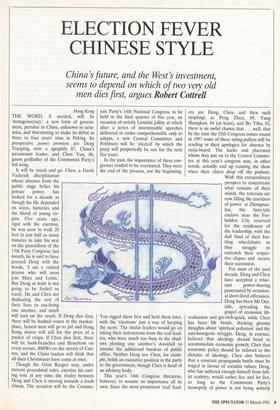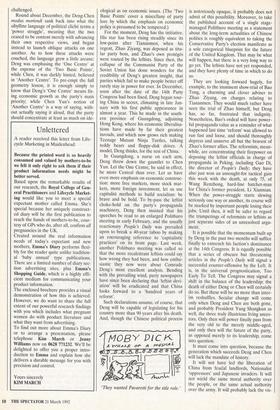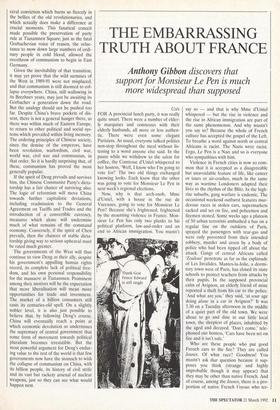ELECTION FEVER CHINESE STYLE
China's future, and the West's investment, seems to depend on which of two very old
men dies first, argues Robert Cottrell Hong Kong THE WORD, if needed, will be `nonagenocracy': a new form of govern- ment, peculiar to China, unknown to actu- aries, and threatening to make its debut in three to four years' time in Peking. Its prospective jeunes premiers are Deng Xiaoping, now a sprightly 87, China's paramount leader, and Chen Yun, 86, gaunt godfather of the Communist Party's left wing.
Though the Grim Reaper may, under current procedural rules, exercise his cast- ing vote at any time, the rivalry between Deng and Chen is moving towards a fresh climax. The occasion will be the Commu- nist Party's 14th National Congress, to be held in the final quarter of this year, an occasion of strictly Leninist jollity at which after a series of interminable speeches delivered in codes comprehensible only to adepts, a new Central Committee and Politburo will be 'elected' by which the party will purportedly be run for the next five years.
In the past, the importance of these con- gresses tended to be overstated. They were the end of the process, not the beginning.
You rigged them first and held them later, with the 'elections' just a way of keeping the score. The titular leaders would go on taking their instructions from the real lead- ers, who were much too busy in the shad- ows plotting one another's downfall to assume the additional burdens of public office. Neither Deng nor Chen, for exam- ple, holds an executive position in the party or the government, though Chen is head of an advisory body.
This year's 14th Congress threatens, however, to assume an importance all its own. Since the most prominent 'real' lead- ers are Deng, Chen, and then such striplings as Peng Zhen, 89, Yang Shangkun, 84 (at least), and Bo Yibo, 83, there is an awful chance that . . . well, that by the time the 15th Congress comes round in 1997 some of these string-pullers will be sending in their apologies for absence by ouija-board. The hacks and placemen whom they put on to the Central Commit- tee at this year's congress may, in other words, actually end up running the show when their elders drop off the podium. With this extraordinary prospect to concentrate what remains of their minds, the veterans are now filling the corridors of power at Zhongnan- hai, the fairy-tale enclave near the For- bidden City reserved for the residences of the leadership, with the dull thud of their bat- tling wheelchairs as they struggle to entrench their respec- tive cliques and secure their succession.
For most of the past decade, Deng and Chen have accepted a reluc- tant power-sharing punctuated by occasion- al short-lived offensives. Deng has been Mr Out- side, spreading the gospel of economic lib- eralisation and get-rich-quick, while Chen has been Mr Inside, thinking gloomy thoughts about 'spiritual pollution' and the anti-bourgeois struggle. Deng, in essence, believes that ideology should bend to accommodate economic growth; Chen that economic policy should be tailored to the dictates of ideology. Chen also believes that a constant propaganda battle must be waged in favour of socialist values; Deng, who has suffered enough himself from left- ist zealotry, would rather live and let live, so long as the Communist Party's monopoly of power is not being actively challenged.
Round about December, the Deng-Chen modus moriendi sank back into what the sibylline language of political cliche terms a `power struggle', meaning that the two ceased to be content merely with advancing their own respective views, and began instead to launch oblique attacks on one another. As to how these attacks were couched, the language grew a little arcane: Deng was emphasing the 'One Centre' at the expense of the 'Two Basic Points', while Chen, it was darkly hinted, believed in 'Another Centre'. To pre-empt the full geometry lesson, it is enough simply to know that Deng's `One Centre' means fix- ing economic growth as the party's main priority; while Chen Yun's notion of 'Another Centre' is a way of saying, with- out actually saying it aloud, that the party should concentrate at least as much on ide-
ological as on economic issues. (The "I'wo Basic Points' cover a miscellany of party lore by which the emphasis on economic policy is presumed to be tempered.) For the moment, Deng has the initiative. His star has been rising steadily since its low-point after Tiananmen, when his regent, Zhao Ziyang, was deposed as titu- lar party boss, and Zhao's own proteges were routed by the leftists. Since then, the collapse of the Communist Party of the Soviet Union has done wonders for the credibility of Deng's greatest insight, that parties which fail to make people better off rarely stay in power for ever. In December, soon after the date of the 14th Party Congress had been fixed, Deng began tour- ing China in secret, climaxing in late Jan- uary with his first public appearance in almost a year. This he made in the south- ern province of Guangdong, adjoining Hong Kong, where his economic liberalisa- tions have made by far their greatest inroads, and which now grows rich making Teenage Mutant Ninja Turtles, talking teddy bears and floppy-disk drives. A model, Deng thinks, for the rest of China.
In Guangdong, a nurse on each arm, Deng threw down the gauntlet to Chen Yun. Let the One Centre, he said in effect, be more Central than ever. Let us have even more emphasis on economic construc- tion: more free markets, more stock mar- kets, more foreign investment, let us use capitalist methods to build socialism: be brave and be bold. To by-pass the leftist choke-hold on the party's propaganda machinery, Deng then insisted that his speeches be read to an enlarged Politburo meeting in early February, and the usually reactionary People's Daily was prevailed upon to break a 40-year taboo by making an encouraging reference to 'capitalistic practices' on its front page. Last week, another Politburo meeting was called so that the more recalcitrant leftists could say how wrong they had been, and how enthu- siastic they now were about Comrade Deng's most excellent analysis. Bending with the prevailing wind, party newspapers have since been declaring that 'leftist devi- ation' will be eradicated and that China looks forward to a 'hundred years of reform'.
Such declarations assume, of course, that Deng will be capable of legislating for his country more than 90 years after his death. And, though the Chinese political process
'They wanted Pavarotti for the title role.'
is notoriously opaque, it probably does not admit of this possibility. Moreover, to take the published account of 'a single stage- managed Politburo meeting as a statement about the long-term actualities of Chinese politics is roughly equivalent to taking the Conservative Party's election manifesto as a sole categorical blueprint for the future of the United Kingdom. That may be what will happen, but there is a very long way to go yet. The leftists have not yet responded, and they have plenty of time in which to do so.
They are looking forward hugely, for example, to the imminent show-trial of Bao Tong, a charming and clever adviser to Zhao Ziyang, on charges relating to Tiananmen. They would much rather have seen the trial of Zhao himself, but Deng has, so far, frustrated that indignity. Nonetheless, Bao's ordeal will have power- ful propaganda value as a reminder of what happened last time `reform' was allowed to run fast and loose, and should thoroughly depress and unnerve all but the bravest of Zhao's former allies. The reformists, mean- while, are concentrating their firepower on deposing the leftist officials in charge of propaganda in Peking, including Gao Di, the director of People's Daily; they have also just won an unsought-for tactical gain this week with the death, at only 75, of Wang Renzhong, hard-line hatchet-man for China's former president, Li Xiannian. When the power-struggle starts slewing seriously one way or another, its course will be marked by important people losing their jobs. Until then, it will be safer to regard the trumpetings of reformists or leftists as just separate sides of an unresolved argu- ment.
It is possible that the momentum built up by Deng in the past two months will suffice finally to entrench his faction's dominance at the 14th Congress. It is equally possible that a series of obscure but threatening articles in the People's Daily will signal a successful counter-offensive by the Left. It is, in the universal prognostication, Too Early To Tell. The Congress may signal a shift in the balance of the leadership; the death of either Deng or Chen will certainly do so. But these will be no more than inter- im reshuffles. Secular change will come only when Deng and Chen are both gone, and probably President Yang Shangkun as well, the three truly illustrious living ances-
tors. Only then will power finally pass from the very old to the merely middle-aged, and only then will the future of the party, as opposed merely to its leadership, come into question.
It must come into question, because the generation which succeeds Deng and Chen will lack the mandate of history.
It will not have led the liberation of China from feudal landlords, Nationalist `oppressors' and Japanese invaders. It will not wield the same moral authority over the people, or the same actual authority over the army. It will probably lack the vis- ceral conviction which burns so fiercely in the bellies of the old revolutionaries, and which actually does make a difference at crucial moments. This fanatical conceit made possible the preservation of party rule at Tiananmen Square; just as the fatal Gorbachevian voice of reason, the reluc- tance to mow down large numbers of ordi- nary people in cold blood, allowed the overthrow of communism to begin in East Germany.
Given the inevitability of that transition, it may yet prove that the wild surmises of the West in 1989-91 were not misplaced, and that communism is still doomed to col- lapse everywhere. China, still wallowing in its Brezhnev years, may just be awaiting its Gorbachev a generation down the road. But the analogy should not be pushed too far. Despite China's brave pockets of dis- sent, there is not a general hunger there, as there was within much of Eastern Europe, to return to other political and social sys- tems which prevailed within living memory. The ordering principles of Chinese society, since the demise of the emperors, have been revolution, warlordism, civil war, world war, civil war and communism, in that order. So it is hardly surprising that, of these, communism has proved the most generally popular.
If the spirit of Deng prevails and survives him, the Chinese Communist Party's dicta- torship has a fair chance of surviving also.
The logic of reformism will move China towards further capitalistic deviations, including readmission to the General Agreement on Tariffs and Trades and the introduction of a convertible currency, measures which alone will undermine much of what remains of the command economy. Conversely, if the spirit of Chen prevails, then the chances of stable dicta- torship giving way to serious upheaval must be rated much greater.
The governments of the West will thus continue to view Deng as their ally, despite his government's appalling human rights record, its complete lack of political free- dom, and his own personal responsibility for the massacre at Tiananmen. Prominent among their motives will be the expectation that more liberalisation will mean more opportunities for trade and investment.
The market of a billion consumers still casts its centuries-old spell. On a slightly nobler level, it is also just possible to believe that, by following Deng's course, China will eventually reach a point at which economic devolution so undermines the supremacy of central government that some form of movement towards political pluralism becomes irresistible. But the most powerful argument for Deng's endur- ing value to the rest of the world is that few governments now have the stomach to wish the collapse of communism on China, with its billion people, its history of civil strife and its vast but rackety arsenal of nuclear weapons, just so they can see what would happen next.




























































 Previous page
Previous page